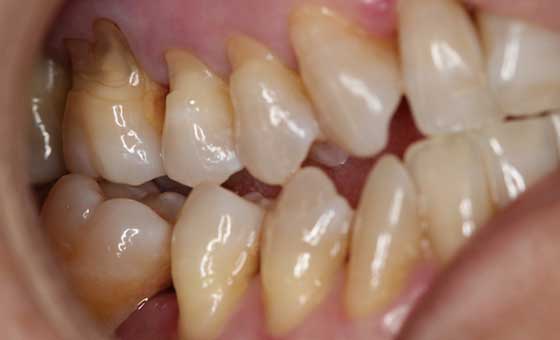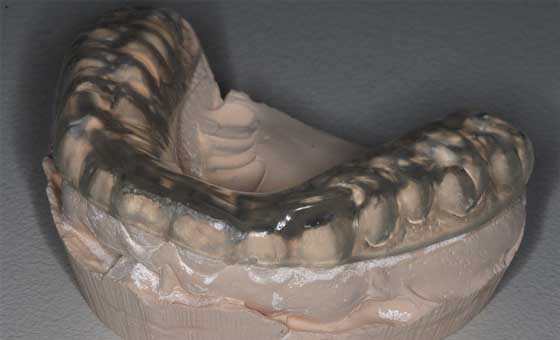Teeth Grinding
Need to stop grinding your teeth while you sleep?
When you look at your teeth in the mirror are they all completely flat? Do you swear they're shorter than they used to be? Or if you slide your jaw over to the side all the edges of the bottom teeth slot in perfectly with the edges of the top teeth like a jigsaw? Then it's pretty likely you grind your teeth during your sleep. Night-time grinding is called Sleep Bruxism.
Here are the signs of teeth grinding or bruxism:

Abfraction - wedges of tooth wear at the gum line
- Chipped front teeth. Often these teeth can chip when you're chewing something soft like a sandwich. The reality is that the damage has been mounting for a while (like a chip in a windscreen) and that soft sandwich was the last straw.
- Wedges of tooth carved out at the gum line, and gum recession called 'abfraction' (see photo). This looks like, and can often be confused with gum recession caused by scrubbing very aggressively when brushing (aka 'tooth brush abrasion'). While abrasion to the gums and teeth from over-brushing is a real thing, and can cause some serious wear and tear on the teeth - if you have these wedges of tooth missing at the gum line, and your gums are receding and you know you're definitely NOT over-brushing, then you're probably grinding.
- Achy jaw and jaw muscles - if you ever wake up with achy jaws, or headaches, or feel like you've been 'punched in the jaws'.
- Sensitive teeth - putting lots of pressure on your teeth for long periods of time during the night can make them sensitive to hot and cold.
- Cracked back teeth.
- Flat edged front teeth.
- Linea alba - raised white line along your cheeks in line with where your back top and bottom teeth bite together.
- Cobbled sides of your tongue - the grooves in your tongue line up with the grooves between your teeth. Not all grinders have these grooves

Night Guard will protect your teeth from grinding